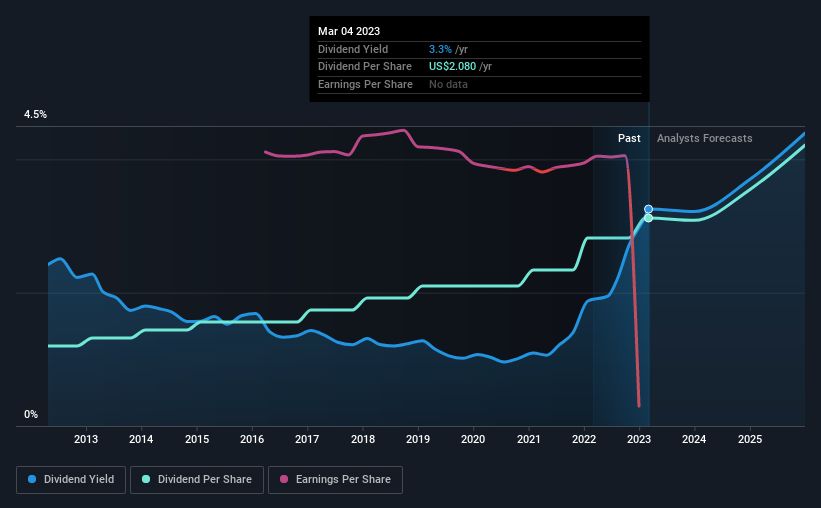Don't Race Out To Buy Fidelity National Information Services, Inc. (NYSE:FIS) Just Because It's Going Ex-Dividend
Fidelity National Information Services, Inc. (NYSE:FIS) is about to trade ex-dividend in the next four days. The ex-dividend date is one business day before a company's record date, which is the date on which the company determines which shareholders are entitled to receive a dividend. The ex-dividend date is an important date to be aware of as any purchase of the stock made on or after this date might mean a late settlement that doesn't show on the record date. Meaning, you will need to purchase Fidelity National Information Services' shares before the 9th of March to receive the dividend, which will be paid on the 24th of March.
The company's next dividend payment will be US$0.52 per share, on the back of last year when the company paid a total of US$2.08 to shareholders. Based on the last year's worth of payments, Fidelity National Information Services has a trailing yield of 3.3% on the current stock price of $63.93. If you buy this business for its dividend, you should have an idea of whether Fidelity National Information Services's dividend is reliable and sustainable. That's why we should always check whether the dividend payments appear sustainable, and if the company is growing.
Check out our latest analysis for Fidelity National Information Services
Dividends are typically paid from company earnings. If a company pays more in dividends than it earned in profit, then the dividend could be unsustainable. Fidelity National Information Services reported a loss last year, so it's not great to see that it has continued paying a dividend. Given that the company reported a loss last year, we now need to see if it generated enough free cash flow to fund the dividend. If Fidelity National Information Services didn't generate enough cash to pay the dividend, then it must have either paid from cash in the bank or by borrowing money, neither of which is sustainable in the long term. Fortunately, it paid out only 45% of its free cash flow in the past year.
Click here to see the company's payout ratio, plus analyst estimates of its future dividends.
Have Earnings And Dividends Been Growing?
Businesses with shrinking earnings are tricky from a dividend perspective. If earnings fall far enough, the company could be forced to cut its dividend. Fidelity National Information Services was unprofitable last year and, unfortunately, the general trend suggests its earnings have been in decline over the last five years, making us wonder if the dividend is sustainable at all.
Many investors will assess a company's dividend performance by evaluating how much the dividend payments have changed over time. Fidelity National Information Services has delivered 10% dividend growth per year on average over the past 10 years.
Remember, you can always get a snapshot of Fidelity National Information Services's financial health, by checking our visualisation of its financial health, here.
The Bottom Line
Has Fidelity National Information Services got what it takes to maintain its dividend payments? We're a bit uncomfortable with it paying a dividend while being loss-making. However, we note that the dividend was covered by cash flow. Overall it doesn't look like the most suitable dividend stock for a long-term buy and hold investor.
With that being said, if you're still considering Fidelity National Information Services as an investment, you'll find it beneficial to know what risks this stock is facing. Case in point: We've spotted 1 warning sign for Fidelity National Information Services you should be aware of.
A common investing mistake is buying the first interesting stock you see. Here you can find a full list of high-yield dividend stocks.
Have feedback on this article? Concerned about the content? Get in touch with us directly. Alternatively, email editorial-team (at) simplywallst.com.
This article by Simply Wall St is general in nature. We provide commentary based on historical data and analyst forecasts only using an unbiased methodology and our articles are not intended to be financial advice. It does not constitute a recommendation to buy or sell any stock, and does not take account of your objectives, or your financial situation. We aim to bring you long-term focused analysis driven by fundamental data. Note that our analysis may not factor in the latest price-sensitive company announcements or qualitative material. Simply Wall St has no position in any stocks mentioned.
Join A Paid User Research Session
You’ll receive a US$30 Amazon Gift card for 1 hour of your time while helping us build better investing tools for the individual investors like yourself. Sign up here

